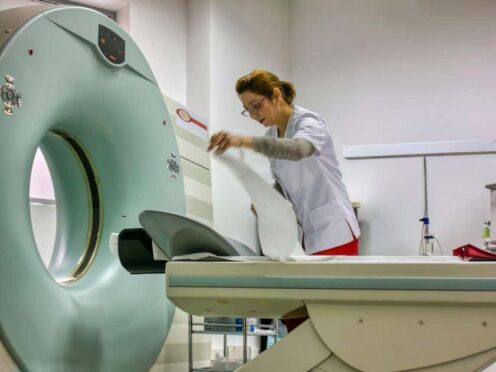More than 380,000 cancer patients have not been treated on time since 2015, according to data analysed by Cancer Research UK.
The charity looked at the number of patients starting treatment for their disease in England more than 62 days after being urgently referred for suspected cancer.
This key NHS target – where 85% of people start treatment for their cancer within 62 days – was last met in December 2015.
It comes as the Royal College of Radiologists (RCR) said delays in cancer care are becoming “routine”, with nearly half of cancer centres experiencing weekly delays to giving people treatment.
The college also pointed to a “staggering” 30% shortfall in clinical radiologists and a 15% shortfall in clinical oncologists – figures which are projected to get worse in the next few years.
Cancer Research UK said that, despite recent improvements, staff are hampered by too few workers and a lack of diagnostic equipment, such as CT and MRI scanners.
In March, the proportion of patients in England waiting no longer than 62 days to receive their first cancer treatment was 68.7%.

Chief executive of Cancer Research UK Michelle Mitchell said: “Each of these numbers is a friend, family member, and loved one who is facing unbearably long waits for their treatment to begin, causing stress and anxiety.
“The General Election must be a turning point for cancer. Nearly one in two people will get cancer in their lifetime and it affects every family in every community.
“Any incoming UK government must make tackling cancer waits a top priority, and pledge to meet all cancer waiting time targets by the end of the next parliament.
“To do this, all political parties should commit to a long-term, fully funded strategy to back cancer research across the UK and improve and reform cancer services in England, in order to provide our health service with much needed equipment and staff.
“Without this, cancer patients will not receive the level of care that they deserve.”
The RCR reports were based on 100% response rate surveys of cancer centre heads and clinical directors of radiology departments in the UK.
The data showed the number of cancer centres experiencing severe delays has almost doubled in a year, with 47% facing weekly delays in administering things like chemotherapy, up from 28% the previous year.
The situation is similar for radiotherapy, with weekly treatment delays nearly doubling from 22% in 2022 to 43% in 2023.
Almost all (97%) clinical directors surveyed said workforce shortages were causing backlogs and delays at their place of work.
The RCR said demand “vastly outstrips” the capacity of the cancer workforce.
Amid the data, the typical age of consultants leaving the workforce has fallen, from 57 in 2021 to 54 in 2023.
The RCR said one third of consultants leaving the workforce are under 45.
RCR president Dr Katharine Halliday said: “Today’s reports reveal a stark reality: the crisis in the radiology and oncology workforce is jeopardising patients’ health.
“Despite our dedication to providing the best possible care, severe workforce shortages are significantly hindering our efforts.
“We simply do not have enough doctors to manage the increasing number of patients safely, and this problem will only worsen as demand continues to rise and more doctors leave the NHS…
“Action from the new government is essential. Time is critical. Doctors are working under extreme stress and are deeply concerned for their patients.
“We urge the new government to heed the advice of doctors and implement a forward-thinking strategy to recruit, train, and retain staff.”
Mairaid McMahon, policy manager at Macmillan Cancer Support, said: “The latest census from the Royal College of Radiologists once again highlights the significant shortages that remain within the cancer workforce.
“These shortages impact negatively on patient care, cause delays to diagnosis and treatment, and could potentially to lead to worsening outcomes for people with cancer.”
Liberal Democrats leader Sir Ed Davey said: “Every day counts in the battle against cancer. But far too many patients are still waiting too long to start treatment after being diagnosed and cancer delays have soared to the worst levels on record.
“That’s why the Liberal Democrats would introduce a legal guarantee for all cancer patients to start treatment within 62 days of an urgent referral.”
A Conservative Party spokesman said: “Cancer survival rates continue to improve in the UK, with the disease being diagnosed at an earlier stage more often. But we know there is more to do.
“We have a clear plan to take bold action which is why we have opened 160 community diagnostic centres around the country which are delivering millions of scans, tests and checks and have committed to building 50 more sites, speeding up results to start treatment more quickly.
“We are also delivering record numbers of doctors and nurses through our long-term NHS workforce plan to ensure we have the workforce we need to diagnose, treat and cure patients with cancer now and in the future.”
An NHS England spokesperson said that it is “vital” for people to come forward if they are concerned about cancer symptoms, adding: “The NHS is seeing and treating record numbers of people for cancer, with 30% more people being treated last year than in 2015/16 and almost three million people receiving potentially lifesaving cancer checks in the last 12 months.”
